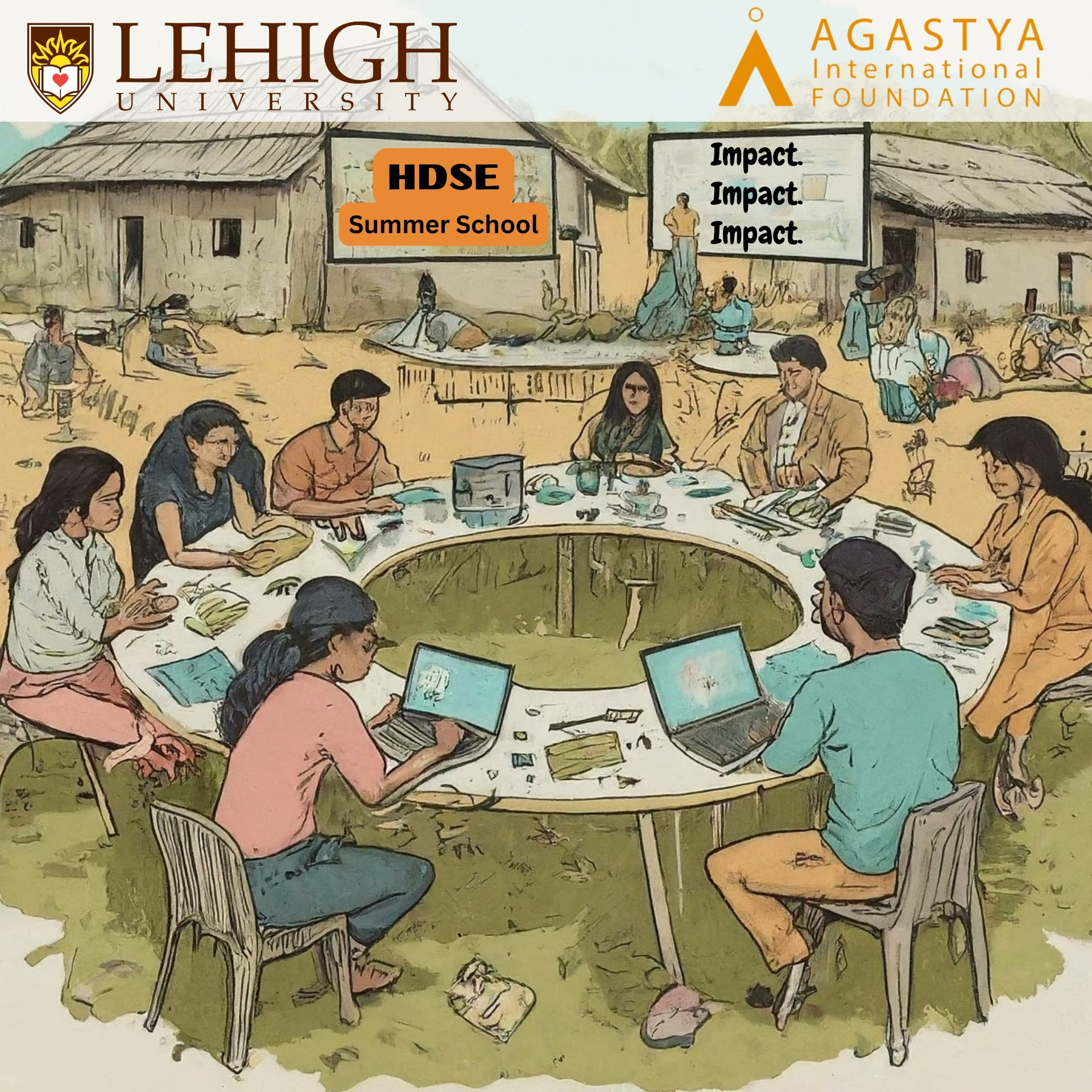Agastya International Foundation – Lehigh University
Humanitarian Design and Social Enterprise (HDSE) Summer School

Dates: 27-30th May 2024
Host: Agastya International Foundation, Kuppam, India
Number of Participants: 25 Students + 15 Agastya Staff and Nonprofit Leaders Costs: Program expenses and meals will be covered for all accepted participants.
Contacts: Shrishail Dhanawade, Agastya International Foundation, Khanjan Mehta, Vice Provost for Creative Inquiry, Lehigh University
Program Summary
The Humanitarian Design and Social Enterprise (HDSE) Summer School is a hands-on hearts-on immersive learning journey, an extended hackathon of sorts, where students and nonprofit leaders collaborate to design and articulate sustainable futures. Rooted in the principles of creative inquiry and the praxis of humanitarian design and social entrepreneurship, HDSE encourages participants to take radical ownership in their work - learning from each other and from every tool and expert at their disposal - to identify actionable opportunities, design innovative solutions, develop sustainable business models, and effectively convey the stories behind their dream ventures to social investors.
The HDSE Summer School aims to foster the next generation of socially conscious changemakers who are equipped to confront the difficult challenges of our time with creativity and resilience. The program is designed by student innovators for other student innovators, to inspire them and develop the skill sets and mindsets necessary for driving sustainable social impact through transformative education.
For Participants
- Immersive Learning: Through a series of workshops, discussions, and hands-on activities, participants delve into the principles of creative inquiry, humanitarian design, and social entrepreneurship. They explore real-world case studies and engage in practical exercises to deepen their understanding.
- Interdisciplinary Collaboration: Participants form interdisciplinary teams, leveraging their diverse backgrounds and expertise to tackle complex challenges. They collaborate closely with mentors and peers, fostering a culture of innovation and co-creation.
- Project Development: Teams work on actionable projects aimed at addressing specific social, economic, and environmental challenges. They develop innovative solutions, design sustainable business models, and refine their storytelling skills.
- Pitch Presentations: At the culmination of the program, teams present their projects to a panel of judges, showcasing their innovative solutions and sustainable business models. This provides an opportunity to receive feedback, gain exposure, and attract potential partners to advance the projects forward.
- Understanding of Global Grand Challenges: Participants will gain a deep understanding of global grand challenges, including social, economic, and environmental issues, and their interconnectedness. They will explore ways in which the UN Sustainable Development Goals (SDGs) influence the day-to-day lives of people across the Indian subcontinent.
- Understanding of Creative Inquiry and Humanitarian Design: Participants will gain a deep understanding of the principles of creative inquiry and humanitarian design, learning how to apply these methodologies to address social, economic, and environmental challenges effectively.
- Understanding of Social Entrepreneurship: Participants will develop a deeper understanding of social entrepreneurship, learning how to identify actionable opportunities, design innovative solutions, and develop sustainable business models that create positive social impact.
- Interdisciplinary Collaboration Skills: Through interdisciplinary teamwork, participants will learn to leverage diverse perspectives and expertise to tackle complex challenges collaboratively. They will develop communication, teamwork, and leadership skills essential for effective collaboration.
- Practical Project Development Skills: Participants will gain practical skills in project development, including problem-solving, ideation, prototyping, and implementation. They will learn how to translate ideas into actionable projects with tangible outcomes.
- Storytelling and Communication Skills: Participants will refine their storytelling and communication skills, learning how to effectively convey the stories behind their projects to various stakeholders, including social investors, partners, and the broader community.
- Critical Thinking and Problem-Solving Abilities: Participants will enhance their critical thinking and problem-solving abilities by engaging with real-world case studies and practical exercises. They will learn to analyze complex issues, identify root causes, and develop innovative solutions.
- Resilience and Adaptability: Participants will cultivate resilience and adaptability, learning how to navigate uncertainty, overcome challenges, and iterate on their ideas and projects based on feedback and changing circumstances.
- Ethical and Sustainable Practices: Participants will develop an understanding of ethical and sustainable practices in social entrepreneurship, considering the social, economic, and environmental impacts of their projects and striving to create positive change responsibly.
10. Network Building: The workshop will enable participants to build a network of like- minded students, faculty, and nonprofit leaders that are passionate about transformative education and social impact.
11. Commitment to Social Impact: Participants will leave the workshop with a commitment to fostering a new generation of socially conscious engineers, designers, entrepreneurs, and leaders.
Day 1 Theme: Creative Inquiry for Transformative Education and Societal Impact Day 2 Theme: Humanitarian Design and Circular Economies
Day 3 Theme: Design Thinking and Social Enterprise
Day 4 Theme: From Ideation to Execution: Final Presentations
